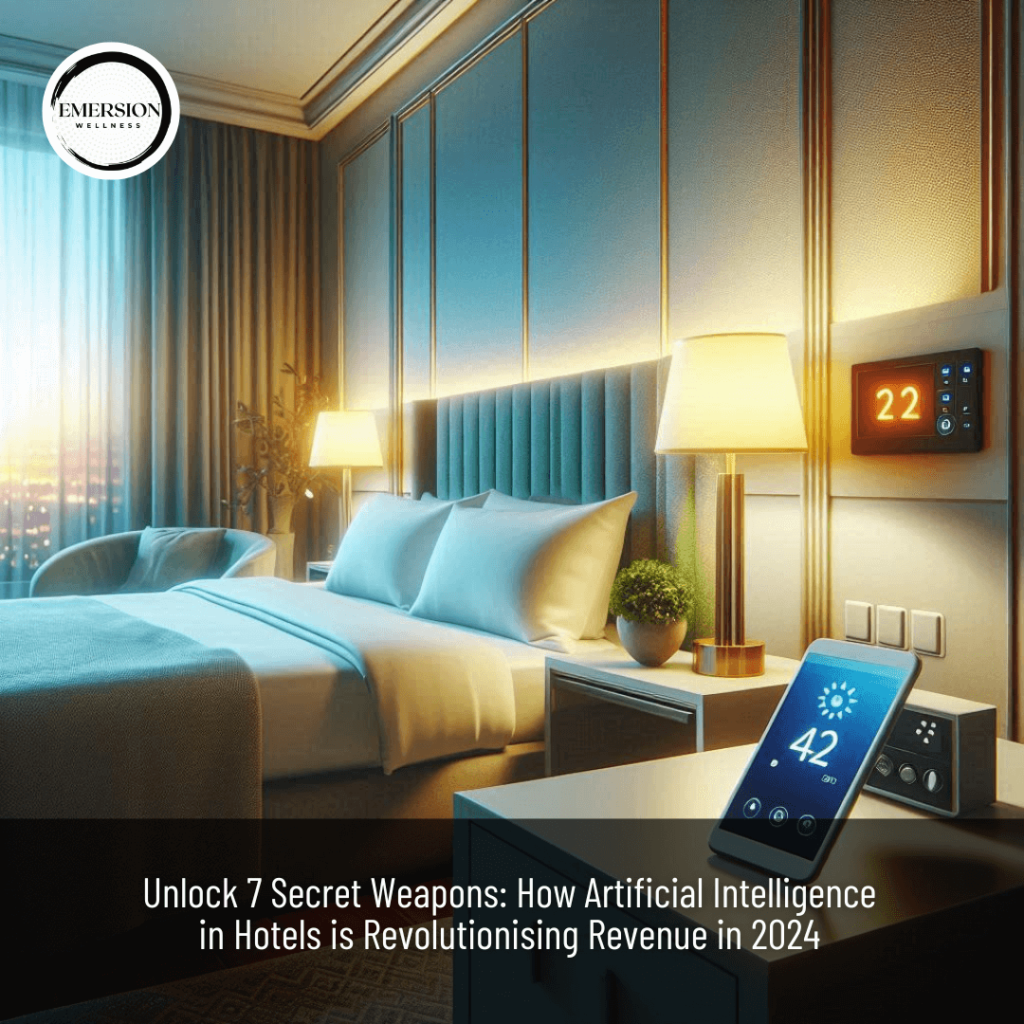The hospitality industry is on the cusp of a technological revolution. Artificial intelligence in hotels is no longer a futuristic concept; it's a game-changer impacting every aspect of hotel operations, from guest experience to revenue generation.
This comprehensive guide delves into the world of AI in hotels, unveiling seven secret weapons that empower hotels to unlock their full revenue potential.
Critical Takeaways
- Artificial intelligence (AI) in hotels is rapidly transforming the hospitality industry, offering hotels a powerful toolkit to boost revenue.
- From personalised guest experiences to dynamic pricing strategies, AI unlocks new levels of efficiency and profitability.
- By embracing AI solutions, hotels can attract new guests, increase guest satisfaction, and maximise revenue across all departments.
Artificial Intelligence in Hotels: Unveiling the Power of AI-Driven Personalisation
Imagine a guest arriving at your hotel, greeted by name and preferences – their favourite room temperature pre-set, preferred amenities stocked in the mini-bar, and personalised recommendations for local attractions. This is the magic of artificial intelligence in hotels in action.
1. Guest Preference Prediction
Artificial intelligence in hotels analyses guest data, including past booking behaviour, reviews, and social media interactions. This allows hotels to predict guest preferences with uncanny accuracy. Imagine automatically upgrading a guest to a room with a balcony based on their love for city views or offering a birthday cake in the room for a special occasion.
2. Hyper-Targeted Marketing
Gone are the days of generic marketing campaigns. Artificial intelligence in hotels personalises marketing messages for each guest segment. Imagine showcasing spa packages to guests interested in wellness or family-friendly activities to those travelling with children. This laser-focused approach leads to higher conversion rates and increased revenue.
3. Streamlined Guest Communication
AI-powered chatbots provide 24/7 guest support, answering questions, resolving issues, and making recommendations. This frees staff time while ensuring guests receive immediate assistance, boosting satisfaction and loyalty.
4. Personalised Restaurant Recommendations
AI analyses guest data to suggest restaurants based on their dietary preferences, budget, and desired cuisine. This elevates the guest experience and incentivises them to dine in-house, increasing food and beverage revenue.
Artificial Intelligence in Hotels: AI-Powered Dynamic Pricing, The Art of Revenue Optimisation
Traditionally, hotel pricing remained static for extended periods. Artificial intelligence in hotels disrupts this by introducing dynamic pricing, automatically adjusting room rates based on real-time demand, competitor pricing, and local events.
1. Maximising Revenue During Peak Seasons
AI identifies periods of high demand and automatically increases room rates, ensuring the hotel captures maximum revenue during peak seasons. This prevents underselling rooms and maximises profits.
2. Attracting Guests During Low Seasons
AI detects low occupancy periods and dynamically lowers prices to attract budget-conscious travellers. This fills empty rooms, generates valuable revenue, and prevents lost opportunities.
3. Capturing Last-Minute Bookings
AI analyses booking trends and identifies potential last-minute vacancies. It then triggers targeted promotions and discounts to fill these rooms, generating additional revenue and preventing lost income.
4. Optimising Packages and Upsells
AI personalises room packages by bundling popular services like spa treatments or airport transfers based on guest preferences. This incentivises guests to spend more, ultimately increasing revenue per available room (RevPAR).
Artificial Intelligence in Hotels: AI Revolutionises Guest Experience, From Check-In to Check-Out
Gone are the days of long queues at reception. AI streamlines the guest journey, offering a seamless and personalised experience from arrival to departure.
1. Self-Service Check-In and Check-Out
AI-powered kiosks or mobile apps allow guests to check in and check out independently, saving them time and providing flexibility. This frees up staff for more personalised interactions with guests.
2. Smart Room Technology
AI-powered smart rooms personalise the guest environment. Imagine guests adjusting room temperature, lighting with voice commands, or controlling entertainment systems through a mobile app. This elevates the guest experience and creates a memorable stay.
3. Real-Time Issue Resolution
AI chatbots connected to hotel management systems allow guests to report issues like malfunctioning air conditioning or room service delays. This enables staff to address problems promptly, ensuring guest satisfaction and minimising inconvenience.
AI Optimises Hotel Operations: Boosting Efficiency and Profitability
Beyond guest experience, AI empowers hotels to streamline internal processes and optimise resource allocation, leading to significant cost savings and increased profitability.
1. Predictive Maintenance
AI analyses sensor data from equipment like air conditioning units or elevators to predict potential failures. This allows for preventive maintenance, reducing downtime and costly repairs.
2. Automated Housekeeping Scheduling
AI analyses guest occupancy data and cleaning times to optimise housekeeping schedules. This ensures rooms are cleaned efficiently, reduces labour costs, and frees up housekeeping staff for other tasks.
3. Smart Inventory Management
AI analyses historical data and guest preferences to predict demand for specific amenities and supplies. This ensures hotels maintain optimal stock levels, preventing overstocking or stockouts.
4. Streamlined Staff Training
AI-powered training modules provide personalised learning experiences for hotel staff. This empowers staff with the knowledge and skills to deliver exceptional guest service, increasing guest satisfaction and revenue.
Artificial Intelligence in Hotels: AI Drives Revenue Through Upselling and Cross-Selling
1. Personalised Upselling Recommendations
AI analyses guest data and booking history to recommend relevant upsells, such as room upgrades, spa treatments, or airport transfers. Imagine suggesting a romantic dinner package to guests celebrating an anniversary or a sightseeing tour to those interested in local history. This targeted approach increases the likelihood of upsell conversion and boosts revenue.
2. Dynamic Restaurant Promotions
AI analyses guest preferences and habits to suggest personalised in-room dining promotions or happy hour specials. This incentivises guests to spend more on food and beverages, increasing revenue for the hotel restaurant.
3. Spa Treatment Recommendations
Artificial intelligence in hotels analyses guest data and wellness goals to recommend personalised spa treatments. Imagine suggesting a stress-relieving massage to a guest arriving after a long flight or a rejuvenating facial to someone interested in anti-aging solutions. This customised approach increases the spa's revenue and guest satisfaction.
4. Data-Driven Loyalty Programs
AI personalises loyalty programs by offering rewards tailored to guest preferences. Imagine awarding points for spa treatments to guests who frequently use the spa or offering room upgrade coupons to guests who typically book premium rooms. This keeps guests engaged and incentivises them to return, boosting long-term revenue.

Artificial Intelligence in Hotels: AI Enhances Hotel Security and Guest Safety
AI plays a crucial role in enhancing hotel security and ensuring guest safety.
1. Facial Recognition Technology
AI-powered facial recognition systems can streamline guest access to hotel facilities, particularly in restricted areas. This technology improves security and eliminates the need for physical key cards.
2. Real-Time Video Surveillance
AI analyses video footage from security cameras, detecting suspicious activity and alerting security personnel. This proactive approach prevents incidents and ensures guest safety.
3. Smart Room Security Features
AI-powered smart rooms offer enhanced security features like automatic door locks that can be controlled remotely or voice-activated safes. This provides guests with peace of mind and a secure environment.
4. Emergency Response Optimisation
AI analyses data from fire alarms, smoke detectors, and other emergency systems to trigger immediate response protocols. This minimises response times and ensures guest safety during emergencies.
Conclusion: The Future of Hospitality is Powered by AI
Artificial intelligence in hotels rapidly transforms the hospitality industry, presenting hotels with a treasure trove of opportunities to enhance guest experiences, optimise operations, and maximise revenue across all departments. By embracing AI solutions, hotels can gain a competitive edge, attract new guests, and foster long-term loyalty.
FAQs
-
What are the key benefits of using AI in hotels?
Personalised guest experiences
Increased guest satisfaction
Dynamic pricing optimisation
Streamlined operations
Reduced costs
Increased revenue across all departments -
How can AI personalise the guest experience?
Predicting guest preferences
Offering hyper-targeted marketing messages
Providing 24/7 guest support through chatbots
Recommending personalised restaurant options -
How does AI optimise hotel operations?
Enabling predictive maintenance for equipment
Automating housekeeping schedules
Streamlining inventory management
Providing personalised staff training -
Can AI help hotels upsell and cross-sell more effectively?
Recommending personalised upsells like room upgrades or spa treatments
Offering dynamic restaurant promotions based on guest preferences
Suggesting spa treatments tailored to guest wellness goals
Personalising loyalty programs with rewards based on guest behaviour -
How does AI enhance hotel security and guest safety?
Utilising facial recognition technology for access control
Analysing video footage for suspicious activity
Offering smart room security features like voice-activated safes
Optimising emergency response protocols through data analysis -
Is AI replacing hotel staff?
No, AI is not replacing hotel staff. Instead, it's empowering them. By automating routine tasks, AI frees up staff time for more personalised interactions with guests, leading to a higher quality of service.
-
What are some challenges associated with using AI in hotels?
Initial investment costs for AI solutions
Ensuring data privacy and security of guest information
Potential for bias in AI algorithms if not carefully monitored -
What are the future trends of AI in the hotel industry?
Increased use of AI-powered robots for guest services and housekeeping
Personalised virtual reality experiences for guests
AI-driven sentiment analysis to understand guest emotions and preferences better
Integration of AI with wearable technology for a more seamless guest experience
Don't miss out on the AI revolution! Contact Emersion Wellness today to explore how our cutting-edge AI solutions can help your hotel unlock its full revenue potential. We offer a comprehensive suite of services, including AI-powered guest personalisation, dynamic pricing strategies, and guest experience optimisation. Our top-ranked weight loss program can also significantly boost hotel revenue by increasing room bookings, spa reservations, and food and beverage sales. Let Emersion Wellness be your partner in achieving hospitality excellence in the age of AI.
Also, see Top 7 Must-Read Hotel Revenue Management Books to Transform Your Business

I'm Nathan Baws, a nutrition nerd, exercise and weight loss expert, and an unwavering advocate for good health. As the founder of Emersion Wellness, I'm passionate about crafting Seamless Weight Loss Programs to supercharge hotel revenue and transform lives. We've pioneered the World's First Plug & Play Weight Loss Programs for top hotels and resorts, sparking a wellness revolution. Beyond my professional journey, you'll often find me hiking, swimming, and riding the waves, embracing every moment in nature. Join me on this exhilarating journey towards diet, health and wellness.

